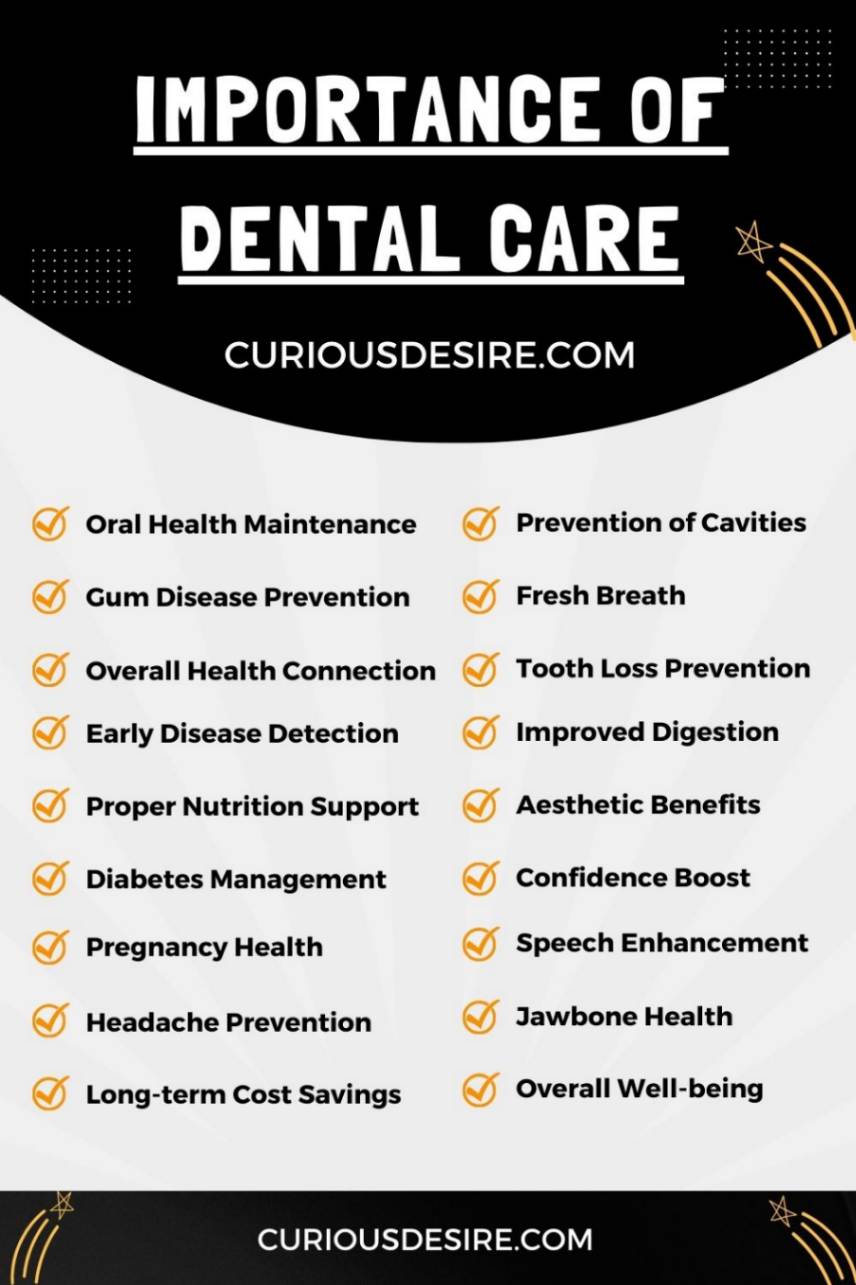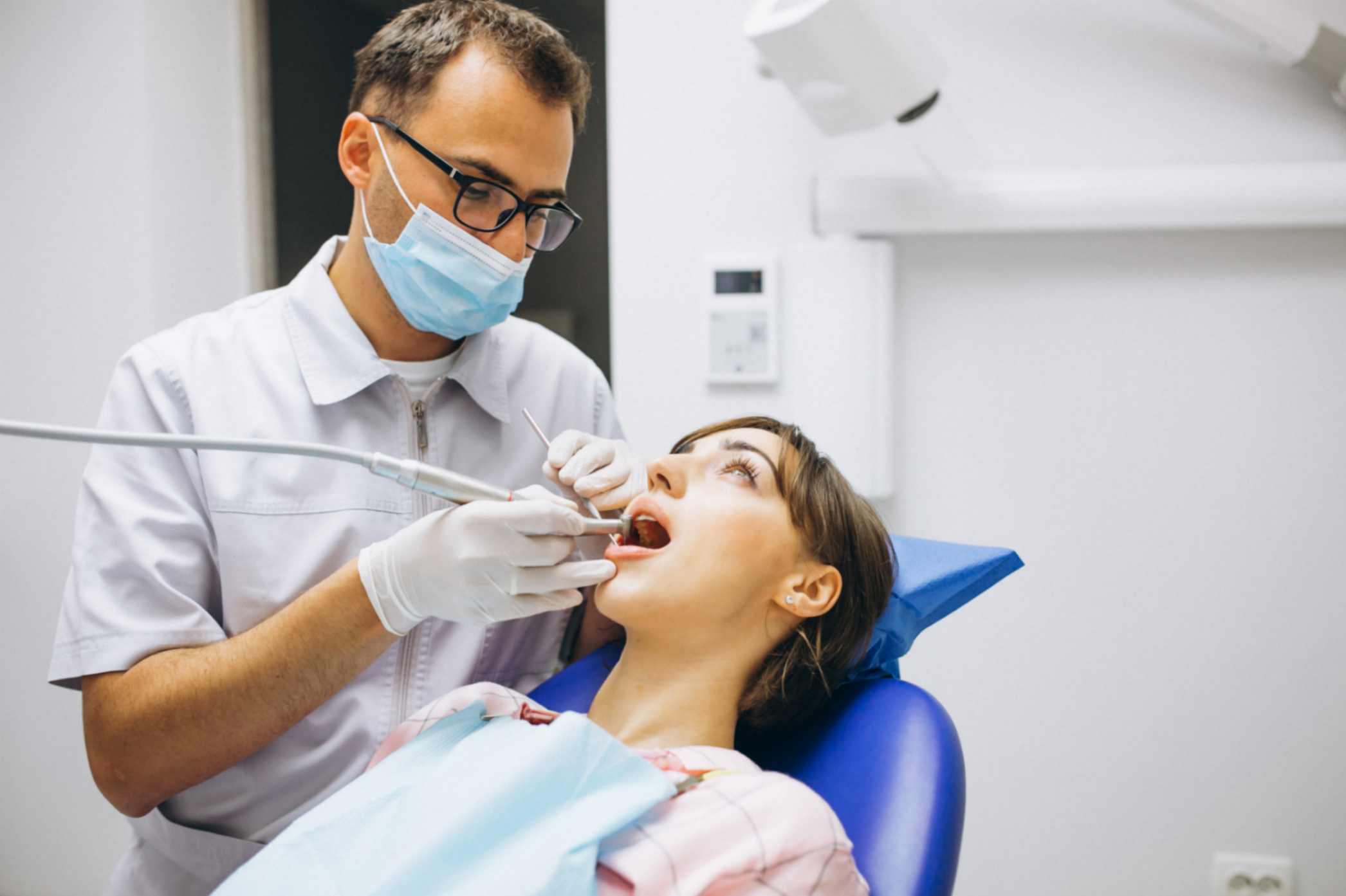Taking care of our teeth is like having a superhero for our whole body. It’s not just about looks; it keeps us healthy.
Brushing every day prevents toothaches, keeps breath fresh, and supports heart health. Dental care is a small habit with a big impact, the key to staying healthy and happy.
This article is all about figuring out why dental care is so important and why those simple habits go a long way.
Each point we’ll explore, from preventing toothaches to supporting your heart health, unfolds the importance of those daily rituals.
So, if you’ve ever questioned why dental care matters, you’re in the right place – we’ve got the answers!
Here are the 5 most common reasons for the importance of dental care:
- Prevention and Maintenance
- Overall Health Connection
- Well-being and Confidence
- Holistic Health
- Long-term Impact

1. Oral Health Maintenance
Oral health maintenance is important for preserving the well-being of your teeth and gums. Regular dental care helps prevent various issues such as cavities and gum disease, ensuring a healthy and functional mouth.
For instance, consistent brushing and flossing can remove plaque, the sticky film of bacteria that accumulates on teeth, preventing tooth decay and gingivitis.
Without proper oral care, these issues can progress, leading to more severe conditions and potentially causing tooth loss. To maintain optimal oral health, it is essential to follow a diligent routine:
- Brush teeth twice daily: Use fluoride toothpaste and a soft-bristle brush.
- Floss daily: Clean between teeth to remove plaque and food particles.
- Visit the dentist regularly: Schedule check-ups and cleanings to detect and address issues early.
- Limit sugary and acidic foods: These contribute to decay and erosion.
- Stay hydrated: Water helps rinse away bacteria and acids.
- Use mouthwash: Incorporate an antimicrobial mouthwash for added protection.
2. Prevention of Cavities
Cavities are like unwanted guests brought in by bacteria living in our mouths. These tiny troublemakers thrive on sugars from our food, creating acids that attack our tooth enamel.
Imagine enjoying your snacks without fearing these uninvited visitors – that’s the essence of preventing cavities.
To keep those cavities away, be best friends with your toothbrush, using fluoride toothpaste. Kick out plaque between teeth with floss, and make regular dentist visits a habit. Say no to too many sugary treats, and your teeth will stay strong.
3. Gum Disease Prevention
Now, let’s talk about gum disease – a party bacteria throw when we forget to clean up properly. Skipping brushing and flossing lets these troublemakers irritate our gums, causing gingivitis and more serious gum problems.
The importance of dental care shines here – it’s not just about avoiding bleeding gums; it’s about keeping our teeth firmly in place.
For gum disease prevention, stick to your dental routine – brushing, flossing, and seeing your dentist. Avoiding tobacco is a superhero move for your gums, reducing the risk of gum disease.
Snack on fruits, veggies, and calcium-rich foods to keep your smile happy and healthy. Remember, a little daily care goes a long way in preserving your oral health!

4. Fresh Breath
Imagine chatting with friends or colleagues, and your words not only convey your thoughts but also carry a subtle, pleasant fragrance. That’s the magic of having fresh breath – it’s like adding a delightful touch to your conversations.
The feeling of your breath smelling clean and fresh doesn’t just boost your confidence; it also makes your interactions more enjoyable for everyone.
Keeping your breath fresh is as simple as regular brushing, flossing between your teeth, and staying hydrated.
When you take care of your mouth, you’re not just preventing bad odors; you’re actively contributing to a positive and comfortable atmosphere.
Think about sharing a funny story or expressing yourself without worrying about your breath – that’s the power of consistently maintaining fresh breath through simple daily habits.
5. Overall Health Connection
Your mouth is like a sneak peek into your overall health. Taking care of your teeth and gums goes beyond having a nice smile; it’s a foundation for your entire well-being.
For example, some health conditions, like diabetes or certain cancers, may show early signs in your mouth. By making sure your oral health is in good shape, you’re essentially supporting your overall health.
Picture your dentist as a health detective during routine check-ups, looking for clues that could hint at potential health issues. It’s not just about having a nice smile; it’s about keeping an eye on your overall health.
Early disease detection through regular dental visits becomes a way to catch potential health problems early and prevent bigger issues down the road.
6. Early Disease Detection
Think of your dentist as a friendly detective during routine check-ups, searching for potential health clues before they become big issues.
These visits are not just about cleaning; they’re an opportunity to catch early signs of diseases like diabetes or certain cancers.
Imagine it like finding a small leak in your house before it becomes a flood – early disease detection through dental check-ups is like being proactive with your health.
It’s not just about caring for your teeth; it’s about keeping an eye on your overall well-being. Regular dental visits become an important step in preventing more significant health problems in the future.

7. Tooth Loss Prevention
Preserving your teeth is like maintaining a strong team for your mouth’s defense. Failure to prioritize dental care can lead to battles lost against gum disease and cavities, resulting in tooth loss.
Your teeth work together like a united squad, and losing one weakens the entire team, affecting chewing and overall oral health. Tooth loss prevention goes beyond aesthetics; it’s about ensuring the efficiency of your dental team.
Regular dental care – brushing, flossing, and check-ups – acts as a protective shield, thwarting potential threats.
This preventive approach not only maintains a complete and confident smile but also secures the resilience and effectiveness of your dental team, offering benefits like efficient chewing and facial structure preservation.
8. Improved Digestion
Your digestive system is like a team effort, with each part playing an important role. Surprisingly, your oral health is the starting point of this digestive symphony.
Proper chewing, facilitated by healthy teeth, breaks down food into smaller, digestible pieces, easing the workload on the stomach and intestines.
Imagine your teeth as the percussion section setting the rhythm for digestion. When you take care of your oral health, you contribute to this harmonious process.
Beyond preventing dental issues, improved digestion leads to better nutrient absorption, aiding in overall health.
So, it’s not just about avoiding stomach troubles; it’s about supporting your body’s digestive system, ensuring a smoother and more efficient performance for your overall well-being.
9. Aesthetic Benefits
Investing in your smile isn’t just about looks; it’s about nurturing a positive image that reflects your overall well-being.
The aesthetic benefits of good oral health involve having teeth that are not only functional but also visually appealing.
Imagine smiling without worrying about discolored, misaligned, or missing teeth – that’s the power of aesthetic benefits.
It’s about feeling good when you see your reflection and exuding a positive image to the world.
10. Confidence Boost
A confident smile is like your personal superpower, and good oral health is the key to unlocking it. When you know your teeth are healthy and your smile is radiant, you naturally feel more self-assured.
Picture confidently engaging in conversations, job interviews, or social gatherings without the hesitation caused by dental concerns.
The confidence boost that comes with a healthy and appealing smile extends beyond aesthetics, impacting various aspects of your personal and professional life.
11. Speech Enhancement
Your teeth play an important role in your ability to articulate words clearly. Speech enhancement is a hidden benefit of maintaining good oral health.
Consider how proper alignment and condition of your teeth contribute to crisp and clear pronunciation.
Now, imagine speaking without concerns about slurring or stumbling over words – that’s the subtle yet impactful role of speech enhancement linked to your oral health.
Ensuring the health and alignment of your teeth supports effective communication and boosts your overall confidence in verbal expression.
12. Proper Nutrition Support
Eating a balanced diet is fundamental to your overall health, and your teeth are essential players in this nutritional symphony.
Proper nutrition support from good oral health involves having strong and functional teeth that allow you to enjoy a diverse range of foods.
Imagine savoring crunchy fruits, hearty vegetables, and protein-rich nuts without discomfort or limitations – that’s the proper nutrition support stemming from a healthy mouth.
Well-maintained teeth enable you to consume a variety of nutrients, contributing to your overall well-being and vitality.
The benefits extend beyond aesthetics and involve confidence, clear speech, and enhanced nutrition support for a wholesome and fulfilling life.

13. Reduced Risk of Heart Disease
Taking care of your oral health isn’t just a favor to your teeth; it’s a vital step in reducing the risk of heart disease.
The connection between oral health and heart health lies in the potential impact of gum disease on cardiovascular well-being.
When gums are inflamed due to poor oral care, harmful bacteria may enter the bloodstream, contributing to heart-related problems.
Picture your oral care routine as a protective shield, preventing these bacteria from infiltrating and reducing the risk of heart disease.
This highlights the importance of comprehensive health care, where good oral health not only preserves your smile but also contributes to the well-being of your heart.
14. Diabetes Management
Beyond blood sugar monitoring, managing diabetes involves considering the intricate relationship between oral health and this metabolic condition.
Diabetes can affect gum health, and gum disease, in turn, can impact blood sugar control. Imagine your oral care routine as a supportive partner in diabetes management, helping maintain a delicate balance.
By prioritizing oral health, you’re not just safeguarding your smile; you’re actively contributing to the overall management of diabetes.
15. Pregnancy Health
Paying attention to oral health during pregnancy isn’t just about a radiant smile; it’s a proactive measure with potential implications for both the mother and the baby.
Poor oral health during pregnancy has been associated with complications such as preterm birth and low birth weight.
Consider oral care as an essential component of a healthy pregnancy, reducing the risk of these complications and ensuring a smoother journey for both mother and baby.
The benefits extend beyond the immediate aesthetic appeal, highlighting the interconnected nature of oral health with broader maternal and fetal well-being.
16. Jawbone Health
Maintaining strong jawbone health is fundamental for the overall well-being of your oral cavity.
Think of your jawbone as the bedrock supporting your teeth – a resilient foundation is essential for their stability and proper function.
By practicing good oral hygiene, including regular brushing, flossing, and dental check-ups, you ensure that your jawbone remains robust.
This isn’t just about preventing tooth loss; it’s about securing the longevity of your oral health.
For instance, when your jawbone is healthy, your teeth align correctly, aiding effective chewing and contributing to your overall oral comfort.
17. Headache Prevention
Effective headache prevention often begins with your oral health practices. Clenching your jaw or grinding your teeth can contribute to headaches, creating discomfort and tension.
Now, imagine a scenario where consistent oral care helps address these issues, preventing unnecessary strain on your jaw and reducing the frequency of headaches.
The benefits extend beyond mere pain relief – it’s about enhancing your daily comfort, minimizing stress, and contributing to an improved quality of life.
Prioritizing oral health becomes a proactive step in preventing recurrent headaches and promoting overall well-being.
18. Reduced Risk of Respiratory Infections
Surprisingly, your oral health can influence your respiratory well-being. Maintaining good oral hygiene acts as a defense mechanism against respiratory infections.
When you engage in regular oral care practices, you create an environment less conducive to harmful bacteria growth in the mouth.
This, in turn, reduces the risk of these bacteria reaching your respiratory system. It’s like having a frontline defense, protecting your overall health.
Prioritizing oral health is not just about a bright smile; it’s about supporting your body’s natural defenses against respiratory infections.
19. Overall Well-being
Your overall well-being is intricately connected to the health of your mouth. Oral care isn’t merely about preventing specific dental issues; it’s a holistic approach to a fulfilling life.
Imagine the confidence that stems from a healthy smile, positively impacting your self-esteem and social interactions.
Beyond the physical aspect, good oral health contributes to emotional well-being, promoting a sense of vitality and fulfillment in various aspects of your life.
Prioritizing oral health becomes a foundational step in nurturing your overall well-being, enhancing both your physical and emotional health.
20. Long-term Cost Savings
: Investing in preventive oral care is a wise strategy for long-term financial well-being. Routine dental check-ups, regular cleanings, and proactive care serve as a financial investment that pays off over time.
Picture this as a scenario where early detection during routine visits prevents the escalation of dental issues, reducing the need for complex and costly treatments down the road.
The benefits extend beyond a healthy smile; they encompass financial well-being by minimizing the long-term expenses associated with extensive dental procedures.
Prioritizing preventive oral care is not just about today; it’s a strategic decision that ensures both oral and financial health in the long run, providing peace of mind and security for the future.
Conclusion
In conclusion, taking care of our teeth is not just a routine; it’s a superheroic act for our entire well-being.
From preventing toothaches to supporting heart health, these simple dental habits play a significant role in our daily lives.
So, if you’ve ever questioned the importance of dental care, the answers lie in the profound impact it has on our overall health and happiness.
As we explore the mysteries of these small but mighty daily rituals, let’s remember that dental well-being is more than a smile enhancer – it’s a fundamental cornerstone for a healthier, happier life.
So, keep brushing, keep smiling, and embrace the superhero within you – your dental care routine!
Importance of Dental Care FAQs
1. Why is brushing your teeth important?
Brushing removes plaque and leftover food, preventing cavities and keeping our teeth strong and healthy.
2. Can bad breath be avoided?
Yes, regular brushing, flossing, and cleaning your tongue help remove bacteria, keeping your breath fresh and your mouth healthy.
3. How does sugar affect our teeth?
Sugar feeds harmful bacteria in our mouths, leading to cavities and tooth decay; cutting down on sugary foods and drinks helps keep our smiles bright.
4. Why are regular dental check-ups necessary?
Regular check-ups catch dental problems early, preventing bigger issues and maintaining our oral health for a bright and confident smile.
5. Is flossing really necessary?
Absolutely! Flossing removes hidden food particles between teeth, preventing cavities and gum disease, and ensuring a thorough clean for a healthy mouth.
6. Does drinking water help dental health?
Yes, drinking water helps rinse away acids and sugars, protecting our teeth from decay and promoting an overall healthy mouth.
7. How does toothpaste work?
Toothpaste cleans teeth by removing plaque, fights harmful bacteria, and strengthens enamel, contributing to a healthier smile and preventing dental issues.
8. Are baby teeth important?
Yes, baby teeth guide adult teeth, so taking care of them ensures a strong foundation for a lifetime of healthy smiles, promoting proper development.